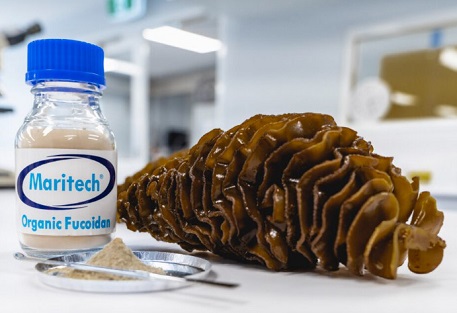Nikhil Prasad Fact checked by:Thailand Medical News Team Nov 07, 2024 5 months, 6 days, 38 minutes ago
Medical News: Researchers from Nanchang University in China have been exploring a natural compound from brown seaweed called fucoidan, which may offer new ways to support gut health and manage inflammation. This polysaccharide, rich in unique sugars, has attracted attention for its potential as a health booster. This
Medical News report highlights a new study focusing on a specific type of fucoidan that has been broken down into smaller, low-molecular-weight pieces. This altered form, called Low-Mw Acidolyzed Fucoidan (LMAF), was tested alongside traditional fucoidan and a high-molecular-weight variety (HMAF) to determine how effectively each type could ease inflammation and strengthen the gut lining.
 Fucoidan Extract Shows Promise for Gut Health and Inflammation Control
Fucoidan Extract Shows Promise for Gut Health and Inflammation Control
The study employed a laboratory model using human gut cells (Caco-2) and mouse immune cells (RAW264.7). Researchers induced an inflammatory reaction in the cells, using lipopolysaccharides (LPS), a compound known to cause immune responses similar to those triggered by bacterial infections. By testing the effects of LMAF, HMAF, and unaltered fucoidan on these inflamed cells, the team sought to uncover which form had the most significant anti-inflammatory impact.
Key Findings: LMAF as a Strong Anti-Inflammatory Agent
The research team found that LMAF showed strong anti-inflammatory properties, outperforming traditional and high-weight fucoidan forms. LMAF was the most effective in reducing levels of nitric oxide (NO), a molecule commonly released during inflammation. Excess NO production can damage healthy cells, and lowering it is essential in managing inflammation.
Fucoidan, HMAF, and LMAF were tested to observe their effects on cell health in inflamed conditions. Results showed that while all forms improved cell viability, LMAF was especially effective in promoting survival and reducing the damage caused by inflammation. Additionally, LMAF substantially reduced the release of inflammatory markers like tumor necrosis factor-alpha (TNF-α), interleukin-1 beta (IL-1β), and interleukin-6 (IL-6) compared to traditional fucoidan and HMAF.
The researchers suggest that LMAF’s lower molecular weight and higher sulfate content may allow it to penetrate cells more easily and bind effectively to receptors responsible for immune response regulation. This aspect of LMAF could make it a valuable addition to treatments aimed at managing chronic inflammation and protecting the gut barrier.
Exploring the Genetic Impact of LMAF on Inflammation
To better understand how LMAF influences inflammation at a genetic level, the researchers performed RNA sequencing on the immune cells (RAW264.7) after treatment. The analysis revealed that LMAF modulates several important pathways involved in inflammation, such as the TNF and NF-kappa B signaling pathways. These pathways play a vital role in immune response and inflammation regulation. Notably, LMAF treatment caused significant changes in gene expression related to inflammatory cytokines and chemokines, including TNF, IL-6, and IL-1&
;beta;, all of which are pivotal in chronic inflammatory conditions.
Interestingly, genes involved in immune cell recruitment and inflammation control were also affected. For example, LMAF was found to suppress the expression of genes like Cxcl2 and Ccl2, both of which are responsible for drawing immune cells to inflamed areas. This suppression suggests that LMAF might prevent excessive immune cell buildup in the gut, which is beneficial in reducing the risk of chronic inflammation and tissue damage.
How LMAF Supports the Gut Barrier
The integrity of the gut barrier is essential for health, as it keeps harmful substances from entering the bloodstream. During inflammation, this barrier can weaken, allowing toxins and pathogens to slip through, potentially leading to more severe health issues. The study found that LMAF was the most effective among the three fucoidan types in supporting the gut’s tight junction proteins - ZO-1, Claudin-1, and Occludin. These proteins work together to create a secure barrier between cells, blocking harmful particles.
The researchers measured the Transepithelial Electrical Resistance (TEER), a marker of gut cell integrity, to assess how well each fucoidan type strengthened the barrier. LMAF produced the highest TEER readings, indicating it best protected the gut barrier from LPS-induced damage. These results suggest that LMAF may provide a promising approach to gut health by reinforcing the body’s natural defenses against inflammation-induced damage.
Potential for Future Applications
The implications of this study are encouraging, especially for people looking for natural ways to manage gut health and inflammation. With its strong anti-inflammatory properties, LMAF could potentially become a natural supplement for individuals dealing with inflammatory bowel conditions or immune-related gut issues. The study’s authors emphasize that further research is needed to confirm these effects in human trials, but the initial findings are promising.
The research, which also suggests that LMAF might offer benefits for immune support and possibly cancer prevention due to its influence on cell signaling pathways, opens the door for exploring more health applications for LMAF. This article shows how LMAF could be a valuable addition to dietary supplements designed to support immune health and maintain gut barrier function.
Conclusion
This study sheds light on the unique properties of low-weight fucoidan (LMAF) derived from brown seaweed. Through careful testing, researchers demonstrated that LMAF provides powerful anti-inflammatory effects and enhances gut barrier integrity, making it a promising option for supporting gut and immune health. The findings highlight LMAF’s potential as a supplement for managing inflammation, reducing oxidative stress, and strengthening the gut against environmental and dietary stressors. As fucoidan research progresses, we may soon see LMAF-based products that help people maintain their health naturally and safely.
The study findings were published in the peer-reviewed journal: Foods.
https://www.mdpi.com/2304-8158/13/22/3532
For the latest Medical Research News, keep on logging to Thailand
Medical News.
Read Also:
https://www.thailandmedical.news/news/herbs-and-phytochemicals-fucoidan-from-ascophyllum-nodosum-and-undaria-pinnatifida-as-a-potential-prophylactic-against-sars-cov-2
https://www.thailandmedical.news/news/breaking-covid-19-drugs-study-shows-that-fucoidan-extracted-from-seaweed-outperforms-remdesivir-in-inhibiting-sars-cov-2-in-cell-studies
